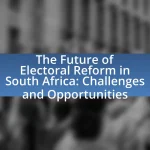The Electoral College in South Africa is a constitutional mechanism for electing the President and Deputy President, as outlined in Section 86 of the South African Constitution. Unlike traditional electoral colleges in other countries, South Africa employs a proportional representation system where the National Assembly elects the President from its members, ensuring that the election reflects the democratic principles of inclusivity and representation. This article explores the structure and function of the Electoral College, its historical context, advantages, challenges, and comparisons with electoral systems in other nations, highlighting its role in promoting fair representation and political stability in South Africa.

What is the Electoral College in South Africa?
The Electoral College in South Africa refers to a mechanism used for the election of the President and Deputy President. This system is established by the Constitution of South Africa, specifically in Section 86, which mandates that the President is elected by the National Assembly from among its members. The process involves a secret ballot, and the candidate must receive an absolute majority of votes to be elected. This method ensures that the President is chosen by the elected representatives of the people, reflecting the democratic principles enshrined in the country’s governance framework.
How does the Electoral College function within the South African political system?
The Electoral College does not exist within the South African political system. Instead, South Africa employs a proportional representation electoral system for national and provincial elections. This system allows voters to cast their ballots for political parties rather than individual candidates, with seats in the National Assembly allocated based on the percentage of votes each party receives. The absence of an Electoral College means that the President is elected by the National Assembly, reflecting the overall party representation from the elections.
What are the key components of the Electoral College in South Africa?
The key components of the Electoral College in South Africa include the National Assembly and the National Council of Provinces. The National Assembly, consisting of 400 members elected through a proportional representation system, plays a crucial role in electing the President. The National Council of Provinces, made up of 90 delegates from the nine provinces, ensures provincial representation in the electoral process. This structure reflects South Africa’s commitment to a democratic and inclusive electoral system, as established in the Constitution of South Africa.
How does the Electoral College influence the election process in South Africa?
The Electoral College does not influence the election process in South Africa because South Africa does not utilize an Electoral College system. Instead, South Africa employs a proportional representation electoral system, where voters cast their ballots for political parties rather than individual candidates. This system ensures that the number of seats a party receives in the National Assembly is proportional to the number of votes it receives in the election. The absence of an Electoral College means that the election process is directly determined by the popular vote, reflecting the will of the electorate more accurately.
Why was the Electoral College established in South Africa?
The Electoral College was established in South Africa to facilitate the election of the President and Deputy President by the Parliament, ensuring a system that reflects the country’s democratic principles. This mechanism was designed to balance representation among various political parties and promote stability in governance following the end of apartheid. The 1996 Constitution of South Africa outlines this process, emphasizing the importance of a collective decision-making body in electing the head of state, thereby fostering inclusivity and accountability in the political system.
What historical context led to the creation of the Electoral College?
The creation of the Electoral College was influenced by the Founding Fathers’ desire to balance the influence of populous states with less populous ones in the election of the President. This system emerged during the Constitutional Convention of 1787, where delegates debated various methods for electing the President. They aimed to prevent direct democracy from leading to mob rule while ensuring that all states had a voice in the electoral process. The compromise resulted in the Electoral College, which allocates electors based on each state’s representation in Congress, thus reflecting both population and state sovereignty. This historical context underscores the framers’ intent to create a federal system that respects the diversity of the states while maintaining a unified national government.
How does the Electoral College reflect South Africa’s democratic values?
The Electoral College in South Africa reflects the country’s democratic values by ensuring proportional representation and inclusivity in the electoral process. This system allows for a diverse range of political parties to participate, which aligns with South Africa’s commitment to a multi-party democracy as established in its Constitution. The proportional representation model, implemented in the 1994 elections, ensures that smaller parties have a voice in governance, thereby promoting political pluralism and preventing the dominance of a single party. This approach is rooted in the democratic principle of representing the electorate’s varied interests, as evidenced by the representation of over 13 political parties in the National Assembly following the 2019 elections.
What are the advantages of South Africa’s Electoral College system?
South Africa’s Electoral College system offers several advantages, including the promotion of proportional representation and the enhancement of political stability. This system ensures that smaller parties have a voice in the political landscape, as the allocation of seats in the National Assembly is based on the percentage of votes received, allowing for a more diverse representation of the electorate. Additionally, the Electoral College helps to prevent the dominance of a single party, fostering coalition governments that can lead to more balanced and inclusive decision-making. Historical context shows that since the end of apartheid, this system has contributed to a relatively stable political environment, as evidenced by the peaceful transitions of power during elections.
How does the Electoral College promote fair representation?
The Electoral College promotes fair representation by ensuring that all provinces in South Africa have a voice in the election of the president. This system allocates electoral votes based on the population of each province, which prevents larger provinces from dominating the electoral process. For instance, the proportional representation model used in South Africa allows smaller parties to gain representation in the National Assembly, reflecting a broader spectrum of political views. This structure is designed to balance the interests of diverse groups, thereby fostering inclusivity and fairness in the political landscape.
What role does the Electoral College play in stabilizing the political landscape?
The Electoral College plays a crucial role in stabilizing the political landscape by ensuring that diverse regional interests are represented in the election process. This system prevents any single demographic or geographic group from dominating national elections, thereby promoting a more balanced political environment. For instance, in South Africa, the Electoral College mechanism allows for proportional representation, which helps to mitigate tensions among various political factions and encourages coalition-building. This approach has been instrumental in maintaining political stability since the end of apartheid, as it fosters inclusivity and reduces the likelihood of extreme partisan conflict.
How does South Africa’s Electoral College compare to other electoral systems?
South Africa’s Electoral College operates through a proportional representation system, which differs significantly from majoritarian systems used in countries like the United States. In South Africa, voters cast their ballots for political parties rather than individual candidates, and the number of seats a party receives in the National Assembly is directly proportional to the number of votes it secures. This system promotes a multi-party democracy and ensures that smaller parties have representation, contrasting with the winner-takes-all approach of the U.S. Electoral College, where the candidate with the most votes in a state wins all of that state’s electoral votes. The proportional representation system in South Africa was established in the 1994 democratic elections, aiming to reflect the diverse political landscape of the nation, while other systems, such as first-past-the-post, often lead to a concentration of power among a few dominant parties.
What are the key differences between South Africa’s Electoral College and other countries’ systems?
South Africa’s Electoral College differs from other countries’ systems primarily in its method of electing the President, which is done indirectly through the National Assembly rather than through a direct popular vote or a separate electoral body. In South Africa, the political party that wins the majority of seats in the National Assembly selects the President, reflecting a parliamentary system, whereas countries like the United States utilize a direct electoral vote system where citizens vote for electors who then cast votes for the President. This distinction highlights South Africa’s focus on party representation in governance, contrasting with the individual candidate focus seen in many other democracies.
How does the Electoral College in South Africa differ from the United States’ system?
The Electoral College in South Africa differs significantly from the United States’ system in that South Africa does not have a formal Electoral College; instead, it employs a proportional representation system where the President is elected by the National Assembly. In South Africa, voters cast their ballots for political parties rather than individual candidates, and the number of seats each party receives in the National Assembly is proportional to the votes they receive. In contrast, the United States uses an Electoral College system where voters in each state cast ballots for electors pledged to vote for specific presidential candidates, with a winner-takes-all approach in most states. This fundamental difference highlights South Africa’s focus on party representation versus the individual candidate focus of the U.S. system.
What lessons can South Africa learn from other electoral systems?
South Africa can learn the importance of proportional representation from other electoral systems, such as those in Germany and New Zealand. These countries utilize mixed-member proportional systems that enhance voter representation and reduce the dominance of a single party. For instance, Germany’s system allows voters to cast two votes, one for a party and another for a candidate, which has led to a more diverse parliament and coalition governments. This approach could help South Africa address issues of underrepresentation and promote inclusivity in its political landscape. Additionally, New Zealand’s adoption of a mixed-member proportional system in 1996 resulted in increased voter engagement and satisfaction, demonstrating that electoral reform can lead to a more representative democracy.
What challenges does the Electoral College face in South Africa?
The Electoral College in South Africa faces challenges such as the complexity of its proportional representation system, which can lead to fragmented political parties and coalition governments. This system, established in the post-apartheid era, aims to ensure fair representation but often results in instability, as seen in the 2019 elections where no party secured an outright majority, necessitating coalition negotiations. Additionally, the Electoral College struggles with public perception and trust, as many citizens feel disconnected from the political process, which can undermine voter turnout and engagement. These challenges highlight the ongoing need for electoral reform to enhance the effectiveness and legitimacy of the Electoral College in South Africa.
How do political parties view the Electoral College?
Political parties in South Africa generally view the Electoral College as a mechanism that ensures representation and stability in the electoral process. The African National Congress (ANC) supports the Electoral College as it aligns with their goal of maintaining a balanced representation of diverse interests in governance. Conversely, smaller parties often criticize the system, arguing that it disproportionately favors larger parties, thereby limiting their influence and representation. This perspective is supported by the fact that the ANC has consistently won a majority in the Electoral College, which reflects the challenges smaller parties face in gaining traction within this framework.
What reforms are being proposed to improve the Electoral College system?
Reforms proposed to improve the Electoral College system include the adoption of a national popular vote, which would ensure that the candidate receiving the most votes nationwide wins the presidency, rather than relying on state-by-state electoral votes. Additionally, some proposals suggest allocating electoral votes proportionally based on the popular vote within each state, rather than the winner-takes-all approach currently used by most states. These reforms aim to enhance democratic representation and reduce the disproportionate influence of smaller states in presidential elections.

What is the future of the Electoral College in South Africa?
The future of the Electoral College in South Africa is uncertain, as discussions about its reform and potential replacement with a more direct electoral system are ongoing. The current system, established in the 1996 Constitution, has faced criticism for not adequately representing the electorate’s will, leading to calls for changes that could enhance democratic participation. Various political parties and civil society organizations have proposed alternatives, emphasizing the need for a system that reflects the popular vote more accurately. These discussions are influenced by historical context, including the legacy of apartheid and the desire for a more inclusive democracy.
How might changes in political dynamics affect the Electoral College?
Changes in political dynamics can significantly affect the Electoral College by altering voter behavior and influencing the allocation of electoral votes. For instance, shifts in party alignment or the emergence of new political movements can lead to changes in how states allocate their electoral votes, as seen in the 2016 U.S. presidential election where traditionally Democratic states voted Republican. Additionally, demographic changes, such as increasing diversity, can impact voter turnout and preferences, thereby reshaping the political landscape and the effectiveness of the Electoral College. Historical data shows that states with changing demographics often experience shifts in electoral outcomes, which can lead to a reevaluation of how electoral votes are distributed.
What potential reforms could reshape the Electoral College in the coming years?
Potential reforms that could reshape the Electoral College in the coming years include the adoption of a national popular vote system, which would ensure that the candidate receiving the most votes nationwide wins the presidency. This reform is supported by the National Popular Vote Interstate Compact, which aims to have states pledge their electoral votes to the national popular vote winner, thereby circumventing the current state-by-state winner-takes-all approach used by most states. Additionally, there are proposals to allocate electoral votes proportionally based on the percentage of votes each candidate receives in a state, which would better reflect the electorate’s preferences. Historical context shows that the Electoral College has faced criticism for not aligning with the popular vote in several elections, notably in 2000 and 2016, highlighting the ongoing debate about its effectiveness and fairness.
How can citizens engage with the Electoral College process?
Citizens can engage with the Electoral College process by participating in the electoral system through voting, advocacy, and public discourse. In South Africa, citizens can influence the Electoral College by voting in national elections, where their votes contribute to the selection of representatives who will ultimately participate in the Electoral College. Additionally, citizens can advocate for reforms or express their opinions on the Electoral College through public forums, petitions, and discussions with policymakers. This engagement is crucial as it shapes the democratic process and ensures that the voices of the electorate are heard in the functioning of the Electoral College.
What practical steps can citizens take to understand and participate in the Electoral College?
Citizens can take several practical steps to understand and participate in the Electoral College by educating themselves about its structure and functions, engaging in discussions, and participating in local electoral processes. First, citizens should research the Electoral College system, including its history and role in elections, which can be done through reputable sources such as government websites and educational institutions. Second, attending community forums or workshops focused on electoral processes can enhance understanding and provide opportunities for dialogue with experts. Third, citizens can participate in local elections by voting and encouraging others to do the same, as this involvement helps to shape the electoral landscape. Additionally, joining civic organizations that advocate for electoral reform can empower citizens to influence changes in the system. These steps collectively foster a more informed electorate and enhance participation in the democratic process.
How can voters educate themselves about the Electoral College’s role in elections?
Voters can educate themselves about the Electoral College’s role in elections by accessing reliable resources such as government websites, educational institutions, and reputable news outlets. These platforms provide comprehensive information on how the Electoral College functions, including its historical context and impact on election outcomes. For instance, the National Archives and Records Administration offers detailed explanations of the Electoral College process, while academic articles from institutions like Harvard University analyze its implications in modern elections. Engaging with these resources allows voters to gain a clearer understanding of the Electoral College’s significance in shaping electoral results.
What resources are available for citizens to engage with the electoral process effectively?
Citizens in South Africa can engage with the electoral process effectively through various resources, including the Electoral Commission of South Africa (IEC), which provides comprehensive information on voter registration, election dates, and procedures. The IEC’s website offers tools for checking registration status and accessing educational materials about the voting process. Additionally, civil society organizations, such as the South African Council of Churches and the Electoral Institute for Sustainable Democracy in Africa, conduct voter education campaigns to inform citizens about their rights and responsibilities. These resources ensure that citizens are well-informed and prepared to participate in elections, thereby enhancing democratic engagement.

